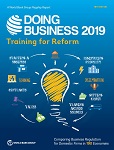
Enforcing Contracts and Resolving Insolvency: Training and efficiency in the judicial system
The case study on enforcing contracts and resolving insolvency examines the education and training that judges receive worldwide. It highlights that training can act as an essential conduit for the introduction of new laws, methods and practices to the judiciary and that in an ever-changing business world, judges’ knowledge must be kept current on the rapidly-evolving business regulatory environment. The case study also features specific examples of two judicial systems – Indonesia and the United Arab Emirates – with adequate education and training frameworks in commercial and insolvency matters for judges.

Enforcing contracts: How judicial efficiency supports freedom of contract
Freedom of contract is the power of contracting parties to freely determine the content of their agreement without interference from the government or from other individuals. Efficient contract enforcement promotes investment by influencing the decisions of economic actors. By promoting investment, good judicial institutions can also contribute to economic growth and development. This case study explores how freedom of contract is regulated in a sample of 34 economies belonging to different regions and income groups. It also looks at judicial efficiency in contract resolution in the same 34 economies, using data for the enforcing contracts indicators as a proxy for judicial efficiency.

Enforcing contracts: Measuring good practices in the judiciary
Doing Business 2016 introduces an important change in methodology for the enforcing contracts indicators. While it continues to measure the time and cost to resolve a standardized commercial dispute, it now also tests whether each economy has adopted a series of good practices that promote quality and efficiency in the commercial court system. This case study discusses many of these good practices and concludes that economies with more judicial good practices in place tend to have faster and less costly contract enforcement.

Improving court efficiency: the Republic of Korea’s e-court experience
Fair, speedy trials are essential for small enterprises embroiled in disputes. If business disputes take months or even years for courts to resolve, small firms might not have the financial strength to stay in business that long, regardless of trial outcomes. Though small and medium-size enterprises usually try to avoid going to trial, effective contract enforcement systems matter for them. Efficient courts and enforcement reduce informality, improve access to credit and increase trade.

Nigeria: Repairing a car with the engine running
Commercial cases in the Nigerian state of Lagos can now be resolved in about a year—in stark contrast to the situation during 16 years of military rule. In 1997 the average duration of commercial cases before the court was over 4 years. This case study tracks how Nigeria modernized court rules, dismissed corrupt judges, and introduced alternative dispute resolution to improve its legal system.

Rwanda: Pragmatism leads the way in setting up specialized commercial courts
After the 1994 genocide, Rwanda recognized that it had to reform its commercial justice institutions. But the country faced a more immediate challenge from the genocide: bringing thousands of perpetrators to justice.

Tonga: Enforcing contracts quickly, with help from the neighbors
The efficiency of contract enforcement was especially poor in Tonga: it ranked 126 of 175 countries. What could be done? Bringing technology to litigation was the suggested answer. And it worked.

Poland: Fighting entrenched interests to enforce judgments faster
In Poland, going through a lawsuit and enforcing a judgment had the potential to be a nightmare. The average judgment took close to half a year to enforce, and hard-to-enforce judgments could take years.

Macedonia FYR: Court reform — Sustained multitasking
In November 2004, the government of Macedonia passed its far-reaching National Strategy for the Reform of the Justice System (2004–2007). Macedonia’s Ministry of Justice then set itself performance markers—an extensive list of goals to be achieved over the short and medium term. The government also provided budget requirements for the program.

Macedonia FYR: Major changes spurred by regional integration
Regional integration efforts such as the accession process of the European Union can help drive reforms in business regulation. This has been the case in FYR Macedonia, which launched a comprehensive reform agenda after applying for EU membership. Its reform agenda has been driven largely by requirements to ensure that the country’s laws are in line with the EU legal framework. Equally important has been the desire to attract investment and develop business activity to create jobs and achieve economic growth.

Mexico: Unleashing regulatory reform at the local level
Mexico’s 31 states and 2,441 municipalities, along with Mexico City, have extensive regulatory powers, allowing them to design, implement and enforce regulations. So regulatory reform has required not only horizontal coordination among ministries, agencies, and legislative and judicial bodies at the federal level, but vertical coordination with entities at the state and municipal levels. The regulatory reform initiative in Mexico has used an exercise of benchmarking business regulation in all 31 states and Mexico City to support this coordination and stimulate change.

United Kingdom: Rethinking regulation
In the United Kingdom in 2005–10 a program reduced the burden of regulatory compliance on businesses by 25% according to the government. That amounted to savings for firms equivalent to £3.5 billion. New initiatives are under way, such as the "one in, one out" system and the Red Tape Challenge.

Tonga: Electronic case management and mediation
A low ranking in the ease of contract enforcement in Doing Business in 2006—Creating Jobs prompted Tonga’s government to seek remedial action. In this Smart Lesson, Anthony D. Ford, Chief Justice of the Kingdom of Tonga, describes the range of activist measures—in particular, the introduction of electronic case management and mediation—that were instrumental in drastically improving the legal process.

Ghana: Establishment of commercial courts
This lesson is part of the Doing Business series, written by "star reformers." An often-repeated remark about George Kingsley Acquah, Ghana’s Chief Justice from 2003 until 2007 and driver of his country's major judicial reforms, was that "it took a man like him for this to happen." Sandra Cofie, author of "Ghana—Establishment of Commercial Courts," says she subscribes to this view. She observed him from her position as Director of the Judicial Reform, Project Development and Implementation Unit at the Judicial Service of Ghana.
